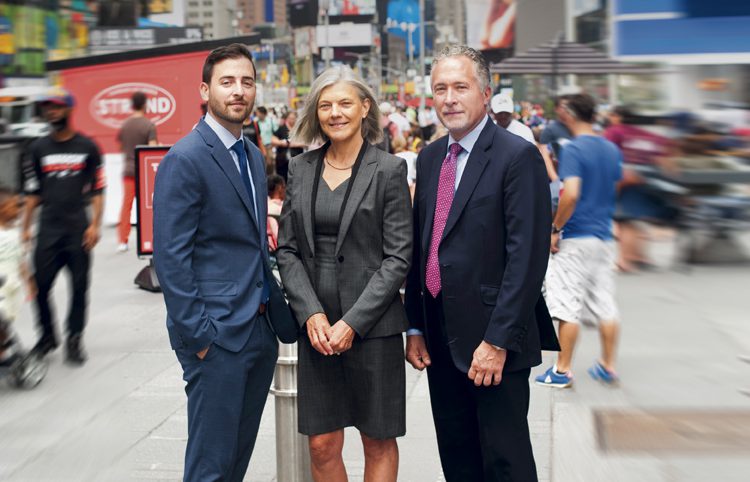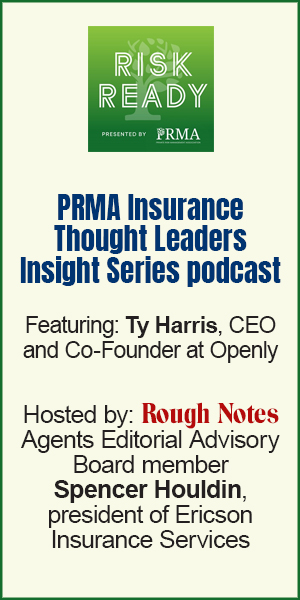OUTSIDE THE BOX
New MGU platform Ethos refines the art and science of specialty underwriting
Does anyone remember the once- powerful phenomenon known as the underwriting cycle? Back in the day, the standard property/casualty market predictably hardened and softened every few years, with competition driving rate cuts until the losses on underpriced business caused insurers to get tough, raise premiums, and even exit troublesome lines and classes.
When standard carriers pulled in their horns amid a sea of red ink, many commercial insureds turned to the specialty market for the coverages they needed to continue operating. There they found not only protection but flexibility, creativity, and innovation—all of which was sadly lacking in the world of standard insurance. Inevitably, as insurers once again loosened their rigid underwriting rules, some customers returned to take advantage of newly attractive rates. Others, who valued the expertise of specialty providers above the lure of low premiums, chose to remain with them.
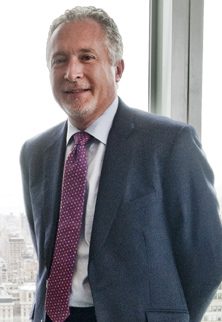
-Rory Cline
Chief Underwriting Officer
Today we find ourselves in the longest soft market in modern history, with few signs of tightening on the horizon. It’s a whole new game, and it may be time to sound the death knell for the underwriting cycle as we knew it. Although standard carriers continue to compete aggressively, specialty MGAs and MGUs are thriving, especially in the market for sophisticated and complex accounts.
A dynamic new player on the scene is Ethos Specialty Insurance Services LLC, a U.S. stand-alone managing general underwriter platform established last year by Bermuda-based Ascot Group Ltd., which writes business in Bermuda and also operates a syndicate at Lloyd’s. Headed by a team of seasoned professionals, Ethos brings skill, savvy, and a laser-like strategic focus to the rapidly changing specialty insurance and reinsurance environment.
To learn about the “ethos” of Ethos Specialty, we spoke with four top executives who deliver a wealth of experience and expertise to the new venture.
Serving as chief operating officer is Justin Meizlik, who began his insurance career at WKFC, where he was vice president of audit and special projects and oversaw multiple MGA companies for this unit of Ryan Specialty Group Underwriting Managers.
Starting from scratch
What appealed to Meizlik about the opportunity to join Ethos Specialty?
“Being part of the Ascot Group was an attractive prospect,” he says, “and I was impressed with the plans that were being put in place for Ethos. We’re looking at 10-year to 25-year returns rather than short-term results. When you’re working with those kinds of time frames, you have the opportunity to build something in a different way.”
Meizlik also was intrigued by the idea of creating a specialty underwriting entity from scratch. “That sounded pretty exciting,” he remarks. “Starting with a clean slate can be daunting, but it’s quite liberating to be able to design systems and processes and put people in place in an efficient way, without trying to build around existing frameworks.”
As chief operating officer, Meizlik is responsible for executing on the key initiatives Ethos is pursuing. Chief among these, he says, is customer service. “I believe my role is to build and maintain an operating platform that provides services to meet the needs of our clients, whether they are our distribution partners, our carrier partners, or our internal underwriting team.”
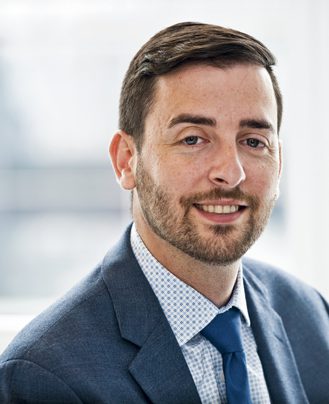
-Justin Meizlik
Chief Operating Officer
In addition, Meizlik says, “An important objective is to leverage technology in a way that makes the insurance transaction more efficient for all parties. To achieve this goal, we’re working to build an infrastructure and a foundation for our platform so it will be flexible and scalable.”
As noted earlier, competition is intense in both the standard and specialty markets. How will Ethos seek to distinguish itself from competitors in this challenging environment?
“I think our advantage is a combination of our products, our services, and our technology,” Meizlik responds. “There are a lot of great products, ideas, and technologies out there, but ultimately if the market doesn’t need a specific product, it’s not going to survive. Our approach is to design insurance products around market needs first and then leverage our platform to build a profitable book of business by delivering best-in-class service. We’re creating efficient, smart systems and workflows so we can offer solutions for the needs of the market. We’re forming partnerships with third-party data vendors with the aim of developing detailed information to use in underwriting so we can deliver better results for our carrier partners and provide competitive quotes to our distribution partners.”
What challenges does Ethos face in today’s marketplace, and what opportunities might those challenges present?”
“I think our main challenge right now is that we’re a new company,” Meizlik says. “That means we have to be highly selective about the direction we take—and be prepared to go in unanticipated directions. We’ll continue to build out our operation as we grow and find a balance between efficiency and the agility necessary to create and deliver a robust suite of products and services. So long as we maintain focus on this challenge, we’ll have the opportunity to achieve our goal of remaining flexible and easily able to integrate with new technologies as they emerge.”
Underwriting discipline
Rory Cline is chief underwriting officer of Ethos Specialty. He joined the new venture at its inception in 2017 and previously was president of Ascot Underwriting, US. Before that he held senior management positions at National Re, GenRe, and CNA Re, and in 2004 he became the founding CEO of managing general underwriter DirectFac.
“At this point in my career I wanted a new challenge,” Cline says. “I wasn’t necessarily looking for another startup, but I was inspired by the example of Jerry Tegan.” Tegan retired from Aon and later joined Patrick Ryan’s then newly formed Ryan Specialty Group. He retired from RSG in 2016 and in March of this year accepted the executive chairman position with Ethos Specialty.
“The opportunity to work with Jerry had strong appeal for me,” Cline says. “It’s exciting, and I think we bring something to the table that’s going to be unique in the long run.”
As chief underwriting officer of Ethos, what objectives is Cline pursuing?
“In the short range, I’m focused on getting the house in order,” he responds. “I like the old Jack Welch question: ‘If you’re handed a clean sheet of paper, what will you do?’ As our head of property, Michael Carr, said to me: ‘I’m not here to recreate what I’ve done before; I’m here to learn from our past and create something new.’ I thought that was a powerful statement about what we’re trying to do here.
“When you get the opportunity to start fresh and your parent is willing to invest in the right people and the systems and technology to build a strong underwriting platform, you can go into the market with confidence,” Cline observes. “We’re committed to delivering superior products and services to carefully selected risks. In today’s environment, insurance is more of a science than an art as it was when I began my career 36 years ago. We’ve engaged an IT services and software company to start building out a robust front-end underwriting system. We’re developing a rating matrix, and our chief actuary, Emily Gilde, brings to the table her impressive analytical ability and mastery of technology. I always thought of underwriting and actuarial functions as two separate disciplines, but I’ve discovered that when the two are melded, the result is a stronger operation.”
Ethos Specialty’s short-term strategies, Cline explains, are intended to create a foundation for the pursuit of longer-term objectives like partnering with carriers and developing products and services that respond to the needs of carefully selected classes.
The first such class is merger and acquisition transactions, for which Ethos has designed a suite of products that offers representations and warranties, tax liability, tax credit, and contingent liability coverage. Ethos has a broad risk appetite and can provide coverage to a wide range of classes and transaction sizes.
“Our M&A team came on board with Ethos Specialty last year and is generating highly successful results in this demanding market,” Cline says. “In our first six weeks we secured $60 million in capacity from London, which I think is virtually unheard of.”
In selecting classes of business to pursue, Cline explains, “We look for risks for which we can bring something different to the table. I’m a big believer in underwriting expertise and specialization. An example of this is our New York contractors liability program under Adam Schnell. It’s a Lloyd’s binder and is an opportunity for us to bring loss control and claims expertise to the underwriting decision tree.”
Citing another example, Cline says, “We are taking a predominantly excess-of-loss approach to property underwriting. We’re also considering whether we want to enter the primary general liability market and will do so only after vetting it carefully. GL is a tough class, and we’d need to build a front-end underwriting model that would allow us to make money in that class.”
A key focus for Ethos Specialty is establishing mutually beneficial partnerships with insurers and reinsurers. “We’re doing a significant volume of business with Lloyd’s; that’s a very deep market for us,” Cline says. “We’re also the only startup MGU platform that our U.S. property paper has ever partnered with to provide primary capacity; we’re very proud of that.”
Poised to become a global operation, Ethos is extremely selective about the carriers with which it does business. “We’re reaching out to highly rated paper. Reinsurers will be a big part of our picture as we go forward in certain classes of business. As an MGU platform, we’re looking for strategic partners that want to get in on the ground floor with Ethos. As we consider what Jerry Tegan created at Aon and RSG, we’re asking ourselves if we can become this $300 million to $500 million MGU platform. We tell our potential capital providers that this is a chance to partner with us at the start and create a meaningful and enduring relationship.”
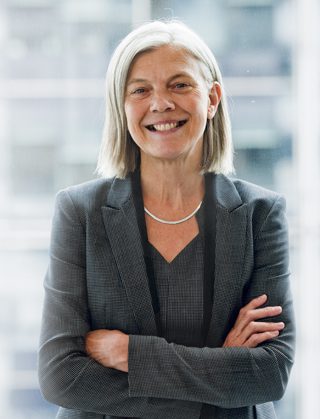
-Emily Gilde
Senior Vice President and Chief Actuary
Underwriting strategy
Good underwriting is nothing if not strategic, and Ethos is committed to bringing discipline, focus, and cutting-edge technology to this vital function. Serving as senior vice president and head of strategic underwriting is John Casella, a 35-year veteran of Chubb who in 2017 retired as chief underwriting officer of surplus lines insurer Chubb Custom Insurance Company.
“After spending 35 years with a large carrier—which became even larger with the ACE acquisition—I wanted to do something that was more entrepreneurial. When I got the call from Ethos, I was ready to sign on. I liked the idea of joining a clean company with no legacy issues, no balance sheet issues—and strong backing from the capital provider. The concept of building an MGU platform was attractive to me, as was the opportunity to work in an environment where all the units weren’t competing for resources as happens in a large organization. I liked the challenge of building something from scratch that could address some of the weaknesses in legacy carrier underwriting platforms.”
As head of strategic underwriting at Ethos, Casella explains, “My job is to leverage my 35 years of experience in commercial underwriting to help build new MGUs for the Ethos side of the Ascot Group. In my unit we help develop underwriting guidelines, design systems that enable underwriters to make more informed decisions, and leverage both internal and external data to create smart underwriting platforms. Our goal is to build platforms that allow underwriters to be free from the traditional routines of reading every word of every application and searching the web for additional information. We also aim to give underwriters more refined tools to make pricing decisions in a way that legacy carriers can’t do because they’re locked into old technology.”
Casella agrees that the days of the traditional underwriting cycle likely are gone. “As long as capacity continues to come into the market, I don’t see anything changing,” he remarks. “We keep hearing that a major hurricane or other disaster will cause the market to harden, but last year we had intense storms like Harvey and Irma that, although costly, did not cause the overall market to harden. What I see instead are ‘mini-hard markets’ where constriction occurs in one line or class but not across the board. Rather than exiting a market segment entirely, insurers are making adjustments to pricing, underwriting, availability, and capacity. I think this trend will continue for the foreseeable future; I don’t anticipate that anything will change in the next two to five years.”
At Ethos, Casella says, “We’re basically entering the market in the middle of the movie, and it’s a challenge to be an MGU representing carriers and using their capital. Our challenge is to become involved in some markets that haven’t performed well and to apply our strategic underwriting approach to produce more favorable results in those sectors than our competitors.”
Actuarial acumen
As mentioned earlier, the senior underwriting team at Ethos works closely with Emily Gilde, senior vice president and chief actuary, who joined the new venture after a distinguished career with leading insurers. Like other key executives, she welcomed the challenge and opportunity to be involved in building a new platform from the ground up.
After holding high-level positions with major carriers, why did Gilde decide to leave that world and join a startup MGU platform?
“Our challenge is to be involved in some of the markets that haven’t performed well and to apply our strategic underwriting approach to produce more favorable results in those sectors than our competitors.”
-John Casella
Senior Vice President and
Head of Strategic Underwriting
“I’ve always been intrigued with the MGU model,” she says. “The production of insurance can be broken down into distinct components: product design, underwriting, pricing, claims payment, and generating the capital required to absorb losses. Throughout my career I worked for entities where all those functions were combined into one. I think the industry has been moving toward segregating those functions, so that the pure underwriting piece is separate from the pure risk-taking piece. In previous positions I worked with catastrophe bonds, which in some ways are similar to the MGU model in which third-party capital is acquired to support insurance risk.”
She continues: “This model was intriguing to me because it involves taking the underwriting piece out and then being, in essence, agnostic about the risk. I was curious about how an actuary could support this process. The Ethos opportunity was a natural fit for me because I came from Nationwide Specialty where I worked with MGAs on the carrier side. I loved analyzing and evaluating new programs. Being with Ethos gives me the opportunity to do that from the other side and do it all the time.
“Traditional carriers tend to have a well-established risk appetite,” Gilde notes. “I wanted to work for a company that had a broader risk appetite. I wanted to get involved with lines of business in which I had never had a chance to work.”
 At Ethos, a key responsibility for Gilde and her team is to evaluate proposals from underwriters for business that they would like to write. “They come to us with their ideas, and our job is to scrutinize each idea to ascertain whether it is likely to generate profitable results. That involves analyzing loss data if available and calculating how we would price this product. If we decide to move forward with the idea, I work with the underwriting team to develop a sales package that they can take to capital providers. I interact with the actuaries who work directly for carriers. Having worked on the carrier side, I know what those actuaries must do to justify supporting a new program or product.
At Ethos, a key responsibility for Gilde and her team is to evaluate proposals from underwriters for business that they would like to write. “They come to us with their ideas, and our job is to scrutinize each idea to ascertain whether it is likely to generate profitable results. That involves analyzing loss data if available and calculating how we would price this product. If we decide to move forward with the idea, I work with the underwriting team to develop a sales package that they can take to capital providers. I interact with the actuaries who work directly for carriers. Having worked on the carrier side, I know what those actuaries must do to justify supporting a new program or product.
“At Ethos our programs undergo thorough due diligence and actuarial scrutiny before they’re even presented to carriers,” Gilde explains. “Based on our analysis, we can tell a carrier what the profitability is likely to be. Often our work requires us to be absolutely forensic in searching for data. Specialty products are so specific to a particular niche that you can’t look at a financial statement and be able to isolate the premiums and losses generated by a product. In many cases virtually no industry data is available. I spend a lot of time digging around in rate filings, searching for clues as to how competitors may have priced similar products in the past.”
Collecting and analyzing big data is a vital function for Gilde and her team. “We’re gathering increasing amounts of big data,” she says. “We’re contracting with outside vendors that are providing data that helps us evaluate the risk at a particular location. Suppose we’re considering providing property and liability coverage for a multi-unit apartment building. Thanks to smart technologies, more and more public data about risks is becoming available, and we use it in deciding whether to write that property. Some vendors specialize in aggregating public data, and in some cases we can use automated procedures to extract data from external databases.”
Gilde is excited about advances in technology that give her and her team access to actionable data from many sources that they can use to develop pricing and profitability models for the products Ethos and its partners are creating. “Our challenge in building these models is to decide how much weight to give each factor involved,” she says. “It’s a learning process, and one that I’m confident we’ll master.”
By Elisabeth Boone, CPCU
For more information:
Ethos Specialty Insurance Services LLC
www.ethosum.com

